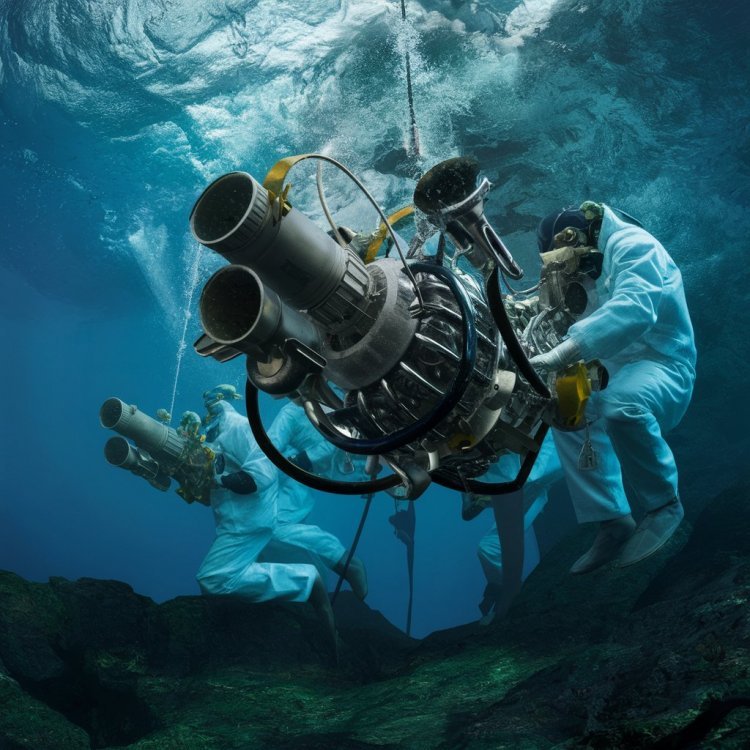Exploring the Astonishing Discovery of Oxygen in the Deep Ocean
Explore the astonishing discovery of oxygen in the deep ocean, challenging established beliefs and reshaping marine ecology and climate science.

In a groundbreaking revelation that challenges existing scientific understanding, researchers have uncovered a significant presence of oxygen in the deep ocean, defying conventional knowledge about marine ecosystems. This discovery, detailed in a recent study published in Nature, has sparked widespread intrigue and could potentially reshape our understanding of oceanic processes and their broader implications for Earth's climate and biodiversity.
The Revelation
Historically, the deep ocean has been perceived as a realm of low oxygen levels, often referred to as "oxygen minimum zones" due to the prevailing belief that oxygen concentrations diminish significantly with depth. However, the findings reported by a team of international scientists suggest a remarkable deviation from this paradigm.
The study, conducted in collaboration with various scientific institutions, including the University of Hawaii and the National Oceanic and Atmospheric Administration (NOAA), utilized advanced underwater sensors to measure oxygen levels at depths exceeding 2000 meters. To their astonishment, the researchers detected unexpectedly high concentrations of oxygen in these deep-sea regions, challenging the long-standing assumptions about oxygen distribution in the oceanic depths.
Implications for Marine Ecology
The implications of this discovery extend far beyond academic curiosity, potentially influencing our comprehension of marine ecology and biodiversity. Oxygen plays a crucial role in sustaining aquatic life, influencing the distribution and behavior of marine organisms across different oceanic zones. The newfound presence of oxygen-rich environments in deeper waters raises intriguing questions about the adaptability and resilience of deep-sea creatures to varying environmental conditions.
Furthermore, understanding these oxygen dynamics could provide critical insights into the global carbon cycle and its interconnectedness with oceanic processes. Oxygen levels influence microbial activity and the decomposition of organic matter, processes that significantly impact the exchange of carbon dioxide between the ocean and the atmosphere. Thus, revisiting and revising our models of oceanic oxygen distribution could refine climate projections and enhance our strategies for mitigating climate change.
Scientific Inquiry and Future Research Directions
The discovery of elevated oxygen levels in the deep ocean underscores the importance of continuous scientific inquiry and technological advancements in oceanography. It challenges researchers to reassess existing models and theories, prompting a reevaluation of how we perceive and study the world's largest ecosystem.
Moving forward, scientists are poised to delve deeper into understanding the mechanisms behind this anomalous oxygen distribution. Advanced instrumentation, including autonomous underwater vehicles and high-resolution sensors, will be pivotal in mapping and monitoring oxygen gradients across different oceanic depths. Long-term observational studies will be crucial in capturing seasonal variations and assessing the stability of these newfound oxygen-rich zones.
Environmental and Conservation Considerations
From an environmental conservation standpoint, recognizing the presence of oxygen-rich deep-sea environments carries significant implications for marine protected areas and biodiversity conservation efforts. These habitats may harbor unique and potentially vulnerable species that rely on specific oxygen thresholds for survival. Protecting these ecosystems becomes imperative to maintain their ecological integrity and resilience in the face of ongoing environmental changes.
Conclusion
The revelation of oxygen-rich environments in the deep ocean marks a paradigmatic shift in our understanding of marine ecosystems. This discovery challenges traditional perceptions and underscores the dynamic nature of oceanic processes. As scientists continue to unravel the mysteries of the deep sea, the implications of this finding for climate science, biodiversity conservation, and environmental policy are profound.
In essence, the journey into the depths of our oceans continues to yield surprises that enrich our scientific understanding and inspire new avenues of exploration. The discovery of significant oxygen levels in the deep ocean exemplifies the transformative power of scientific inquiry and underscores the importance of preserving our planet's most vital ecosystems for future generations.
For more updates on groundbreaking scientific discoveries and their implications, stay tuned to reliable sources and subscribe to our newsletter for the latest insights. Your curiosity fuels our exploration of the unknown, shaping the future of scientific discovery and environmental stewardship.
What's Your Reaction?




















